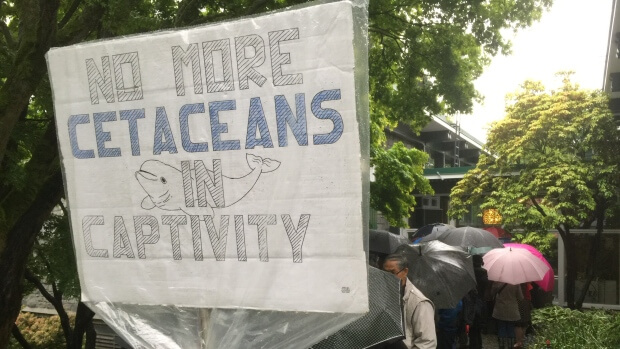The Vancouver Park Board has voted in favor of amending a bylaw that would effectively prevent any new whales, dolphins and porpoises from being kept on display at the Vancouver Aquarium.
Under the revised bylaw, “no person shall produce or present in a park a show, performance, or other form of entertainment which includes one or more cetaceans.”
Park Board commissioner Catherine Evans said the bylaw allows Vancouver to “catch up” in terms of the ethical treatment of animals.

“It’s not only can you do this, but should you do this,” she said. “And so, I think, yes we can keep cetaceans in captivity … but I think we have reached the point now where we know that we shouldn’t where there are other options.”
Whale Sanctuary Project President Dr. Lori Marino said that the Park Board’s decision will push the Vancouver Aquarium into a new future where dolphins and whales are respected for who they are.
“They will eventually realize that this new future is not an apocalypse, as they would claim it is, but an opportunity to continue to be a leader in authentic conservation and public outreach.” “No person shall produce or present in a park a show, performance or other form of entertainment which includes one or more cetaceans.”
The Park Board’s decision comes just a week after the government of France passed legislation that will end the breeding of all whales and dolphins in captivity and that requires captive facilities to make their pools and tanks “significantly larger.”
Other countries have passed similar legislation: In 2013, India banned cetacean captivity outright; Canada is currently considering doing the same. And in the U.S., the National Aquarium in Baltimore is phasing out its dolphin exhibit and planning to relocate the dolphins to a sanctuary.
Vancouver Aquarium CEO John Nightingale had argued that the board’s decision could be a death sentence for injured or sick marine mammals who the aquarium rescues and treats through its Marine Mammal Rescue Program.
But Park Board commissioners responded that the Marine Mammal Rescue Centre, is not in any way affected by the Park Board’s decision, since its facility, unlike the aquarium itself, is not on Park Board land.
And Park Board chair Michael Wiebe added that when it comes to rescues, cetaceans are best treated in their natural habitats.
Indeed, the board praised the work of the rescue program, noting that most of the 100-plus marine mammals saved annually are eventually released. Those kept in captivity are mainly harbor seals, who are not cetaceans, so the amendment will have little effect on the existing program.
The amendment that the board has approved was proposed on the heels of the deaths of the aquarium’s resident beluga whales last fall. Qila and her mother Aurora died in November of unknown causes. The aquarium wanted to replace them and to open a new $20-million beluga habitat.
At the Park Board meeting to announce the decision, commissioner Stuart Mackinnon took issue with various statements that had been made by aquarium CEO Nightingale, and spoke plainly in his response.
“It is a lie to say that the Park Board does not support the Marine Mammal Rescue Center,” he said. “It is a lie to say that members of this board favor euthanasia for other animals. And it has done a disservice to the marine mammal rescue center, to the aquarium and to this board to suggest otherwise.
Mackinnon acknowledged that he has personally long opposed keeping whales and dolphins in captivity. “It is not a secret … I have said so in elections.” But he said the other commissioners made up their own minds on the basis of the evidence and the testimonies presented at the hearings.
“We had two nights of hearings,” he said. I know that the majority of the commissioners had not made up their mind before coming to the board for those nights. They heard compelling testimony from citizens, and made up their minds for that.”